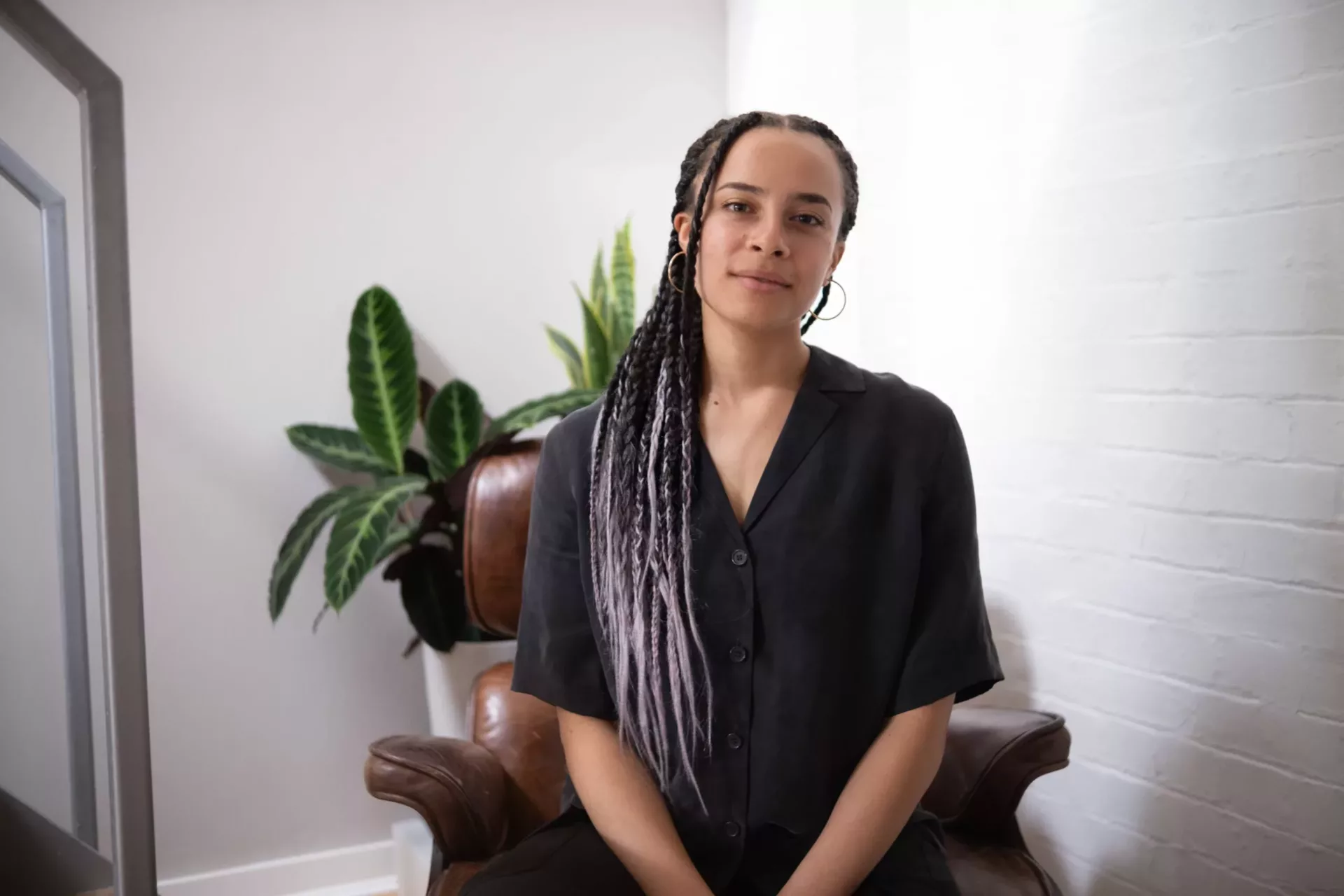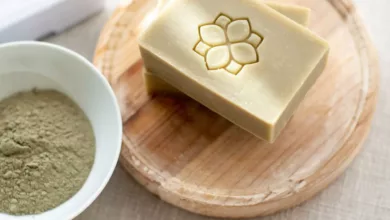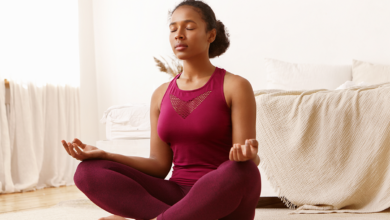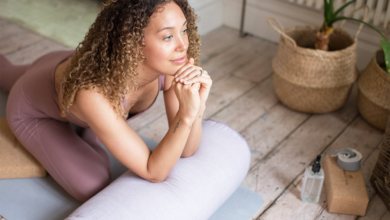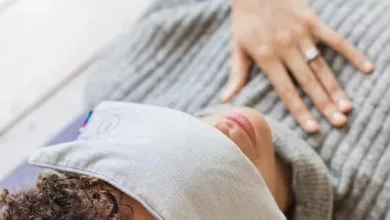Rebekah is a medical doctor, yoga teacher, wellness entrepreneur and a board member of the Yoga for Healthcare Alliance. She is the founder of Pana, a platform that intersects wellbeing and culture sharing yoga, music and food from the African diaspora and beyond. After facing her own challenges with mental health, she learnt the value of slowing down and engaging with mind-body practices. Through classes, supper clubs and workshops, she creates inclusive spaces for people to nourish their wellbeing and reconnect with themselves and those around them.
Tell us about your yoga journey
Since my teenage years, I had gone through a lot of cycles of burnout and mental health difficulties. I’ve always worked hard and put a lot of pressure on myself (like many people do), and I got to a point after 3 years of medical school where I needed a break. I was completely exhausted, so I managed to arrange to take a year out of med school. I had lots of clinical research to do off the back of a project and decided to go and do this in the Caribbean.
I ended up on an island off the coast of Panama volunteering in a beach hostel and living with yoga teachers for two months. I started practicing yoga every day – I thought, ‘this is amazing, I feel great!’. By living with these teachers, I was hearing about elements of yoga for the first time such as chakras and the eight limbs. Before then, I’d thought yoga was just poses and stretches but I started to be exposed to the history, the philosophy, breathwork, and different styles of yoga. By the end of two months, it became an integral part of my daily routine and I realised that this is something that keeps me well, I needed to make sure this stayed in my routine going forward.
How did you make the decision to become a teacher?
I had a lot of time for self-reflection in Panama. I knew that the minute I got back to London this thing would fly out of my routine and other things would feel more urgent and important. So I felt I needed to work in this space. I was going back to medical school in September, after which I wouldn’t have much time and so, I thought about teacher training. I thought maybe I was doing teacher training a bit early but I know everyone’s journey is different – I was fortunate to have the time and finances then I knew I wouldn’t in the next few months. I found one which started in three days, booked it and went! I ended up in Spain at a yoga school; I thought, even if I don’t end up teaching in the end what a great way to deepen my experience and understanding. I was there for a month, came back and started teaching in the park. Friends and family came to my classes and I was teaching with reggae music in the background. Two years later I am teaching in studios, have finished medical school and am plodding along.
What kind of yoga teacher would you say you are?
I would say I like to be creative; I like to understand and learn traditions and present them in my own way. I love bringing new people into yoga and helping them to explore new things, and love creating a space where they feel calm and relaxed. It doesn’t necessarily mean being still and quiet, but knowing that you can just breathe and be yourself, laugh, be a bit silly and try new things.
Tell us about the idea behind your platform – Pana
My mum is Jamaican and my dad is English. We moved to Devon when I was 8 years old, I spent ten years growing up in the countryside. Growing up as a bi-racial child brings its own identity questions. Moving back to London was about exploring my black heritage.
Pana brings together my interests – it’s all about celebrating black culture, exploring healthy Caribbean food, and helping people from diverse communities find yoga, medicine and the tools to keep well! I want it all to come together and hope others want to come and join me, but you have to carve your own path to do that and think about creating spaces that don’t necessarily exist currently.
You’ve also recently started working as a junior doctor. At this early stage, how do you see your career panning out?
I’m not someone who gets fixed on the future or develops 10-year plans saying I’m going to end up here… that’s evident from me booking things a few days before I leave! I think from the time I took a year out I was having feelings of being interested in lifestyle medicine. I’ve always enjoyed exercise and been interested in nutrition, and part of my disconnect with medicine was that there was not any real focus on that. Lifestyle medicine didn’t exist as far as I was aware. I didn’t hear anyone in the medical space talking about yoga or mindfulness or breathwork 5 – 10 years ago. In the last few years, I feel it’s become more mainstream. Which specialty? I’m pretty sure I’ll be community focused – very likely general practice. An environment where I can talk to people more about lifestyle, their daily health and mental health is important to me. Possibly in the future creating a physical space that integrates medicine, yoga, culture and food.
How are you navigating all the things you want to do whilst also working as a busy junior doctor?
I work part time. Most people don’t know you can do part-time as a junior doctor – it’s not promoted and you have to apply – I specifically sought it out as I knew it was right for me. It has been more possible for doctors to go part time now. Why not allow this if it means that staff are happier, healthier and not burning out and having to leave medicine completely (which some people don’t want to do but don’t necessarily have a choice)? I find amongst my cohort and people I’ve spoken to, it’s very much being on a set path that you have to keep bulldozing through. If you don’t have the time to think about another option, then you just keep going. The most common thing I get told from everyone is – ‘just get through this bit, power through, then you can relax’. But when I get through this bit, there will always be something else to do. What if I can just enjoy the journey? Everyone has different visions and goals for their life; my priority is making sure I don’t have a breakdown along the way, can navigate my schedule and do other things I enjoy.
Is there more in the medical school curriculum these days about wellness and lifestyle?
It’s creeping in. I can see a huge difference from when I started in 2014 to 2021. I was first exposed to mindfulness through medical school – it was an optional module and there was nothing in the core curriculum, but if you were looking for it you could find it. Coming to the end of medical school I’ve seen things like Nutritank – medical students promoting the importance of nutrition and bringing it to their peers. I found out through working with the Yoga in Healthcare Alliance that in Boston a group of medical students were practicing yoga for eight weeks while also looking through yoga research papers – we were hoping to bring something similar to King’s College London but then the pandemic hit. Something like that would be a way for people who are in the early stages of their medical career to understand yoga and for it to become a normal part of healthcare going forward. We are getting there slowly.
Do you see any difficulties with bridging that gap between yoga and healthcare?
I’ve always found the two to be really complimentary, but it comes with a certain mindset – to be open-minded to say, ‘my ultimate goal is to be well and healthy and let me open my eyes to all the avenues to get there’. If you are tunnel-visioned and say this is what I know to be right and I know that science is the only thing I should trust, and then someone comes forward with ancient philosophy, it may be easy to say that’s nonsense. My avenue for starting a conversation would be, ‘what have you heard about yoga, have you ever tried it, what’s your impression?’. Only from there can you gauge what people’s ideas and preconceptions are, before you can start recommending or talking about this text or that – which can make people shut down.
I don’t necessarily see conflicts; I see things coming from different angles and you can take all of that information together to help achieve a goal for you or your patient’s health.
How do you go about recommending yoga to patients?
I tend to ask, ‘have you heard of it and what do you think?’ first. There’s a big spectrum but I recommend depending on what they’re coming in with. The beauty of yoga is that there is something for everyone whether it’s stress relief/relaxation, your mobility needs improving, you’re getting back pain or your lung function isn’t good. I open that dialogue with them and point them in the direction of ‘look at this place, try exploring this’. So they are hearing someone talk about it in a positive way but not being too narrow.
I also say every teacher will teach differently and if you don’t think it’s for you that’s OK – try something different. Yoga doesn’t even necessarily involve movement. There’s breathwork. Rather than say ‘you should do yoga’, it’s about opening the conversation of what yoga can look like and how it might be helpful for you.
It’s wonderful to be that person who gets to introduce yoga to someone. How do you go about getting new people to try it?
When teaching in a studio, my experience has been that often there might be only one person of colour in the class, which is hard to ignore when you are also a person of colour. Through my own teaching and business, I thought, ‘how can I reach communities where they feel like it’s not for them?’. I grew up listening to reggae so it felt very natural to incorporate this in my practice – it’s something that makes me feel calm. I run a wonderful event called Dub Garden Yoga & Picnic where we do yoga to reggae and we have health Caribbean food afterwards. I teach it in the park which makes it more accessible and affordable, as well as allowing us to enjoy nature. I have attendees of all ages, backgrounds, ethnicity and ability – for many people it’s their first-ever yoga class. They feel comfortable coming as they resonate with the food and music, and the yoga is something they think ’OK, let me try that too’. It’s relaxed, fun and there’s no seriousness about it.
What does a day in the life of Rebekah look like?
I enjoy having diversity across my week so many of my days look quite different. On a hospital day, I’m in work at 8am for handover in A&E then seeing a number of patients across the day coming in with different conditions. Hospital days are always busy but interesting. In the evenings I’m working on the business or practicing self-care. Some of my favourite routine days are spent at my yoga studio (Levelsix) doing laptop work, drinking tea and enjoying a lunchtime yoga class.
Has your own practice changed as a result of your teacher training?
When I started it was all very vinyasa focused which is the same for many people. In London, everyone’s doing HIT classes, dynamic vinyasa and has an attitude of ‘I just need to exercise!’. The teacher training was where I discovered all the different styles of yoga (yin, ashtanga, restorative). It took me about two weeks before I really started to feel my body and mind relax – I started crying in a restorative class as I forgot how relaxed I could be. I reached a new set point of calm in my body and it was quite overwhelming. But I knew then – this is where I know I can reach and want to be. From that point I understood the value of slower practices like yin and restorative and how essential that was for me. I started teaching restorative yoga which is such a beautiful experience – creating a space for people where they can relax too.
If there was something that you would recommend for wellbeing beyond practising yoga, what would it be?
Sleep – good quality sleep makes such a difference, and bad quality sleep affects everything. I try to do a meditation every night before bed and that’s really helped.
What are your favourite piece of equipment/prop to use during your practice and why?
My favourite prop is definitely a bolster! I love doing restorative poses supported by a bolster including under the knees in savasana. Even in vinyasa classes I sometimes have one handy in case fancy a supported child’s pose. I find a bolster really elevates the relaxation and calm I can feel in a class.
What’s coming up for you and Pana?
I’m really excited about a few things on the horizon. I’ve started working with some great organisations to share yoga, forest bating and wellbeing workshops for young creatives and people of colour in London which has been really rewarding. I’m also planning my first abroad retreat! We’re heading to The Gambia in 2023 for a fusion of yoga and culture to rejuvenate and discover more about Africa.
Find Dr Rebekah
Website – https://wearepana.com/
Instagram – @weare.pana
Personal – @zeena.ldn
Aus der Feder von Yogamatters
